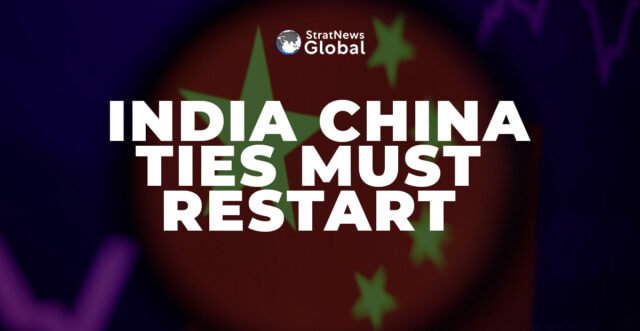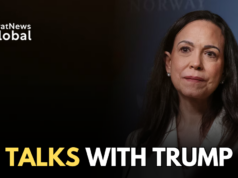“Prime Minister Narendra Modi and President Xi Jinping should meet soon to bring our ties back on the right track.”
This post was made on X (formerly twitter) from former journalist Sudheendra Kulkarni. It came two days before Modi’s third swearing in ceremony on Sunday.
The post in the context of his calling on China’s new Ambassador Xu Feihong attracted a lot of attention. Within a few hours, it garnered more than 5,600 views, which amply demonstrates the public fascination or curiosity about anything to do with China.
“I discussed with the Chinese envoy the need for resuming leadership level dialogue between Prime Minister Narendra Modi and President Xi Jinping both on multilateral fora such as BRICS and SCO but also more importantly bilateral summits,” he told StratNews Global in an interview.
He says a new beginning in India China relations is possible if both countries resume dialogue at the highest political level, on a clean slate.
“We cannot have the aftermath of Galwan block momentum in India China relations forever. We have to find a breakthrough,” he argues.
“India is a global power and India China relations must always be based on the principle of equality. We are not lesser or subservient to China. We are equal to China but historically, we have inherited a problem of the border and it needs to be resolved peacefully once and for all.’’
“I told the ambassador that there is a strategic confluence in Prime Minister’s vision of Vishwabandhu and President Xi Jinping’s vision of building a community of shared future for mankind. I told him that I see no conflict between India’s strategic vision and China’s strategic vision.’’
Modi wants to be friends with all countries in the world including the U.S. and China. India is not in this or that camp. Vishwabandhu is a reaffirmation of a strategic autonomy principle which again is an extension of the non-aligned principles.
Kulkarni says that India committing to the One China policy will go a long way in finding a solution to the boundary dispute. He cautioned that it would be against India’s national interest to side with America in challenging the one-China policy.
India committed to the One China policy many years ago but has stopped reiterating it since 2010, insisting that it should be a two-way street. Meaning that China should accept that J&K is a part of India and stop the practice of issuing stapled visas. China has not done so.
But Kulkarni’s vision appears singularly focused on China.
“I strongly believe that we should not make any deviation from our One China policy. We should explicitly say and repeat this that we are against Taiwan’s independence and that Taiwan is part of the People’s Republic of China. We should also say that India wants peaceful reunification. This will help immensely and work wonders.”
At the same time, he says every country should be mindful of national interest while pursuing its foreign policy.
“India’s national interest is how do we resolve this boundary dispute with China once and for all. If India sides with America in challenging the one-China policy, then we will be in trouble.’’
Indian diplomats with long experience of China say Beijing increasingly sees India as part of the U.S. camp. It flows from policies designed to boost India’s local industry. Those range from mobile phones to telecom equipment, solar panels to electric vehicles. These have hit Chinese exports of such goods to India. India is also closely scrutinizing Chinese proposals for FDI.
In the last two decades, Kulkarni has met every Chinese ambassador. Although Galwan shocked and distressed him, it has not deterred him from pursuing his vision of better relations between the Asian giants.
Delhi based journalist pickled in journalism. Have reported from nine world capitals and almost all parts of India. Over the last three decades, I have worked for India’s mainstream English dailies and contributed to All India Radio, Doordarshan and Women’s Feature Service. Also worked for international media including Japan’s leading newspaper, The Asahi Shimbun and done assignments for The Sunday Times, London, The Telegraph, The Guardian and the Canadian Broadcasting Corporation. Worked in the Embassy of France in New Delhi and can speak French to save my life. Write on Diplomacy, Politics and the social sector. Love Nature, heritage, Nature, animals and vintage cars. Enjoy cycling and playing badminton.





